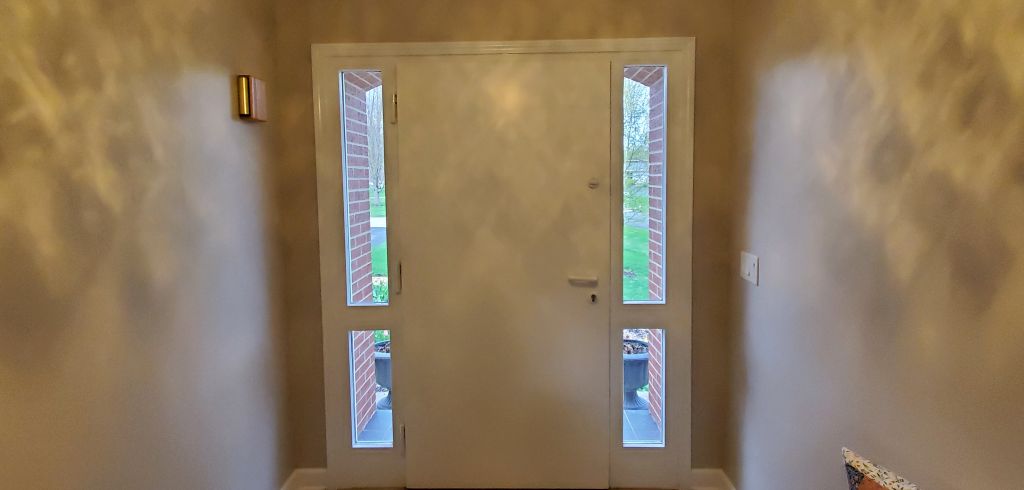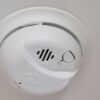One morning while at my mother-in-law’s house in Iowa, I stepped outside to feed her cat at 5am while everyone was still asleep. The door blew shut and locked me outside. I tried calling my wife multiple times with no answer. I tried tapping on her window, banging on her window, tapping on my mother-in-law’s window, banging on her window, and lastly ringing the doorbell. This went on for 15 minutes. Someone finally woke up, turned on the lights, and there was talking inside. Finally, the door opened. As I started to step in the house the cat looked at me and said, “See how I feel buddy?”
Locked doors are not fun – especially if you’re the one who is locked out – or maybe even locked in.
The disciples were gathered in an upper room – and they had the door locked. They were too afraid of the Jews and the Romans to leave, so they sat there in that upper room praying, arguing, discussing, and pondering about what had just happened. Can you imagine the conversations that took place in that room – what were they thinking, feeling, saying, and asking?
Let me ask a few questions of my own. If you were with a small group of people and Jesus would suddenly appear, how would you react? Would you freak out? Would you hide in fear? Would you make a run for the door? Would you doubt? Would you ask for proof? Would you not believe it if you weren’t in the room when it happened? Or would you cry out in love, “My Lord and My God?”
The locked door that St. John talks about is more than just a door with a deadbolt. He is describing the interior condition of the disciples. The locked places of our lives are always more about what is going on inside of us rather than outside of us. Locked doors represent fear.
 Those locked doors remind us of the times that we have closed ourselves off to the Lord by our thoughts and actions. Think about this: what are the closed places in our lives? Maybe, like the disciples, it’s fear. Maybe it’s unanswered questions or disbelief. Perhaps it is sorrow or loss. Maybe it’s failure, resentment, or being unable or unwilling to open ourselves up to new ideas, possibilities, or change. Maybe the wounds of our self-doubt are so deep that it does not seem worth the risk to step outside.
Those locked doors remind us of the times that we have closed ourselves off to the Lord by our thoughts and actions. Think about this: what are the closed places in our lives? Maybe, like the disciples, it’s fear. Maybe it’s unanswered questions or disbelief. Perhaps it is sorrow or loss. Maybe it’s failure, resentment, or being unable or unwilling to open ourselves up to new ideas, possibilities, or change. Maybe the wounds of our self-doubt are so deep that it does not seem worth the risk to step outside.
Fear can make us act irrationally against one another or even ourselves. When we feel that we’re not good enough, or strong enough, not beautiful enough, not worthy enough, or not loved enough – that is fear lying to us.
However, Jesus penetrates that fear and appears to the disciples (and us), despite the locked doors. Jesus answers fear with peace. But we will never experience true peace until we face and overcome our fears. This Easter season is the perfect time to stop being afraid, to face our fears head-on, and ask if we have locked ourselves in. If so, it is time to unlock the door.
I truly believe that Thomas has taken a bum rap all these years as we continue to call him “Doubting Thomas.” But how much are we like Thomas? Let’s be honest: all of us at one point or another have wished or wondered why Jesus doesn’t give us a sign, or a voice, or same sort of revelation so that our faith, our belief, and our trust in him might remain strong.
Here’s the thing: there is only one cure for our doubt and that is to spend more time with Jesus so that we recognize him. Every time we hear the Word of God, Jesus steps into our lives. Every time we open our hearts in prayer, Jesus is present. Every time we receive Jesus in the Eucharist, Jesus is within us. Do we believe this?
Jesus tells Thomas that he doesn’t have to see, just believe – believe the witness of the others, believe the words that I told you; believe, have faith, and trust me. This might be what Jesus said to Thomas that day, but couldn’t that be Jesus’ words to us today as well? As St. Augustine said, “Faith is to believe what you do not see; the reward of this faith is to see what you believe.”
The first reading from the Acts of the Apostles provides us some valuable lessons as we try to live out this faith. One lesson is that of community. Throughout Acts, we see the early Christians gathering together, supporting one another, and sharing their resources. This sense of community is essential for us today as well. We are called to be part of this Holy Archangels faith community, where we can deepen our relationship with God and support one another on our spiritual journey’s. That is why we come here week after week.
Another lesson is the importance of evangelism. The apostles were passionate about spreading the Gospel. In our current society, where so many people are searching for purpose and meaning, we must share the message of Christ with boldness – living as Jesus lived and being witnesses of God’s love so that others can experience the transformative power of Jesus.
All of our readings today stress the importance of having an encounter with our risen Lord. When Jesus unlocked the doors of the disciples’ hearts, they became empowered to step outside of their comfort zones, emerging from behind locked doors to fearlessly and courageously proclaim the Gospel to those who were lost.
That’s why it’s so important that we have an encounter with Jesus so we too can experience what’s on the other side of the door. The word ‘encounter’ simply means to ‘run into’ – and running into God is the best thing that can happen to us. True story…
When I was in grade school, we were playing outside in the church parking lot during recess. I’m not sure what we were playing, but I was running around looking up in the air trying to catch something. (Kids, do not try this at home or school.) Suddenly, BAM! I ran smack-dab into the light pole and landed flat on my back and was knocked unconscious. The next thing I remembered was waking up in the nurse’s office. I had the biggest bump on my forehead in the shape of an egg and it had a purple tint to it (which was quite timely as it was right before Easter.) I remember my Dad coming to get me, saying jokingly, “Maybe that will knock some sense into you.”
But that’s exactly why we need to run into God. We need an encounter with God because it will transform us, give us purpose and direction, and yes, maybe even knock some sense into us.
 When we allow God into our lives, an encounter will happen! When God truly touches us, we are changed – body, soul, and spirit, for we cannot have an encounter with God and remain the same!
When we allow God into our lives, an encounter will happen! When God truly touches us, we are changed – body, soul, and spirit, for we cannot have an encounter with God and remain the same!
My sisters and brothers, Jesus is always entering the locked doors of our lives: unexpected, uninvited, and sometimes even unwanted. Jesus steps right into our closed minds and hearts and calms our fears. He stands among us offering peace and breathes new life into us. Now, he doesn’t always open the door for us, but he gives us what we need so that we might open our doors to a new life, to a new way of being, and to a new realization that we are strengthened and sent to carry on the mission of Christ. All we need to do is unlock the door.
The value of our Catholic faith lies in its witness. Find out more here.






Beautiful thoughts beautifully expressed. Thanks.